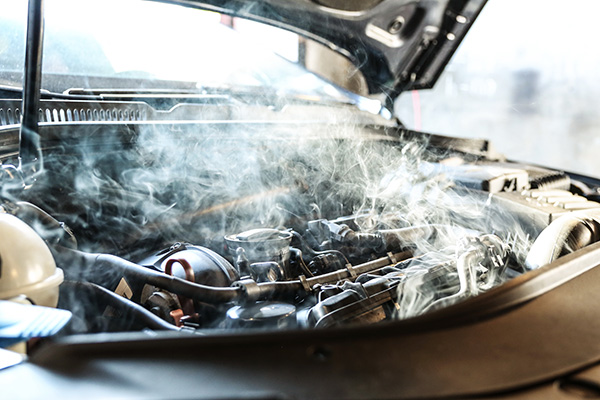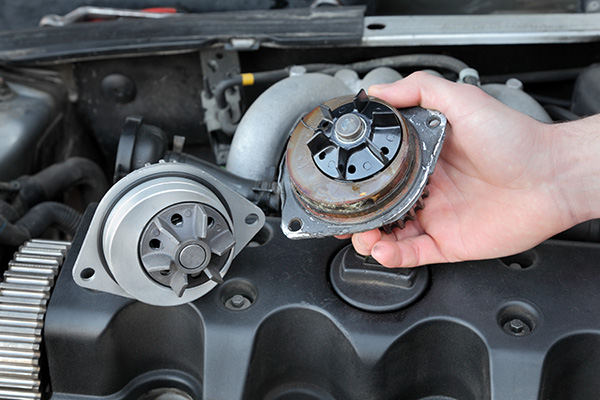Posted on 5/29/2024

When you're cruising down the road and your engine starts to overheat, it's more than just an inconvenience; if not addressed promptly, it can lead to serious damage. Knowing the signs of an overheating engine can save you money and a lot of stress. But how can you tell if your engine is overheating? Let's dive into the key indicators and what you should do if you find yourself in this hot situation. Signs Your Engine Is Overheating1. Temperature Gauge or Warning Light The most obvious sign of an overheating engine is the temperature gauge on your dashboard creeping into the red zone. Today's cars are equipped with warning lights that will illuminate when your engine is getting too hot. Pay attention to these indicators, as they are your first line of defense against severe engine damage. 2. Steam or Smoke If you see steam (often mistaken for smoke) coming from under the hood, pull over immediately. This is a clear ... read more
Posted on 4/28/2024

Your vehicle's water pump is essential for circulating coolant through the engine to maintain optimal operating temperature. Understanding the signs that your water pump may be failing is necessary to prevent costly damage and ensure your vehicle's longevity. The Role of Engine Cooling System Your vehicle's engine generates a significant amount of heat during operation. A properly functioning cooling system is essential to prevent overheating and potential damage. At the heart of this system lies the water pump, which circulates coolant throughout the engine, absorbing heat and transferring it to the radiator for dissipation. Signs Your Water Pump May Be Failing:Coolant Leaks One of the most common indicators of a failing water pump is coolant leaks. You may notice puddles of coolant forming under your vehicle when parked or a visible drip coming from the engine area. These leaks can occur due to a worn-out seal or a c ... read more
Posted on 3/28/2024

Welcome to the world of auto glass repair, where the clarity of your windshield and windows plays a crucial role in your driving safety and comfort. In this article, we'll delve into what auto glass repair entails, when it's necessary, and why every vehicle owner needs to understand. Auto glass repair is an essential aspect of vehicle maintenance, ensuring the integrity and safety of your vehicle's windshield and windows. But since it isn't performed regularly, there are a few things you should know about it. We'll examine the intricacies of auto glass repair, its significance, and why all vehicle owners must grasp its importance. What is Auto Glass Repair? Auto glass repair involves restoring or replacing damaged or compromised auto glass components, such as windshields, side windows, and rear windows. Whether it's a minor chip, crack, or shattered glass, a ... read more
Posted on 2/29/2024
%20(Small).jpeg)
In the realm of diesel engines, fuel additives play a vital role in enhancing performance, improving efficiency, and prolonging engine life. However, with many options available on the market, understanding the different types of diesel fuel additives and their specific functions can be overwhelming for consumers. Understanding Diesel Fuel Additives Diesel fuel additives are chemical compounds formulated to enhance the properties of diesel fuel and optimize engine performance. These additives are typically blended with diesel fuel in small quantities to address specific issues or improve overall fuel quality. While the primary function of diesel fuel additives is to improve combustion efficiency and maintain engine cleanliness, they can also offer additional benefits such as lubrication, corrosion protection, and emissions reduction. Types of Diesel Fuel Additives Cetane Boosters Cetane boosters are designed to increase the cetane number of diesel fuel, which correlates with ... read more
Posted on 1/30/2024
%20(Small).jpeg)
The I-91 highway weaves through some of the region's most scenic yet potentially difficult stretches. Whether you're a daily commuter, a business traveler, or just passing through, knowing the dangerous spots along this route is essential for a safe journey. Why Is I-91 So Important and Busy? Stretching from the Massachusetts border to New Haven, the I-91 isn't just a road. It connects major cities, facilitates commerce, and is a preferred route for many traveling to and from work. This heavy usage, combined with diverse terrain and weather conditions, makes some sections particularly risky. 1. Hazardous Curve and Bottleneck near Route 3 in Wethersfield One notorious stretch is near the intersection with Route 3 in Wethersfield. Known for its tight curves and frequent lane shifts, drivers need to be especially alert here. The area often becomes a bottleneck ... read more